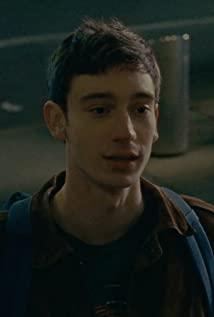Everything starts with a mistake.
A mistake that happened both in front of and out of the frame of the camera.
A small town in the east of the United States, a high school party for the occasion, an unusually silent girl. The presupposition of the naturalistic performance style of independent films makes people curious about her reticence. In the story, the young girl shuttles between the home, the clinic and the supermarket where she works. Before the story, it is not difficult to imagine that his life scene should be home, school and supermarket where he works. The story unfolds, and the mystery is slowly revealed: at school, she is an ununderstood Stockholm syndrome, and the clue is in her song at the beginning of the film; at home, it is even better than the outside world - with her mother relying on others, her stepfather's words and actions even It hints at the possibility of sexual assault; while the harassment of supermarket customers and managers is a familiar phenomenon: it happens every day, but no one discusses it.
That's why she's been tight-lipped about the unwanted pregnancy: because she knows there's no outlet for her in any hemisphere of life. So even if the New England winter sun is cold and bright, it still can't dispel the dark clouds from the girl's eyebrows.
Defiance is nose piercing, and abortion. Because the body is her only remaining autonomy.
This is reminiscent of the Darney brothers' "Rosetta", which also has hand-held lenses, facial close-ups, and basically no soundtrack. It also occurs in the low-saturation northern hemisphere winter; but the latter is more in terms of form and content. Far: Rosetta's ultimate defiance is suicide. But the eclecticism in style does nothing to diminish the penetrating power of Never.
The journey begins when the two go to New York together.
Unlike road films in the most general sense, their means of transportation are Greyhound buses, subways, city buses, elevators, and feet when necessary. Correspondingly, the space where the protagonist stops briefly is the waiting room, the subway at night, the electronic playground and snack shop in Chinatown, the bowling hall, karaoke, and the public restrooms of the above places.
Empty footage through a car window en route composes a wintery New England landscape. Town streets, mines, snow on the ground, deciduous forests, frozen lakes. Passing through a dark tunnel is a three-day, two-night adventure in the New York jungle: subway conductors, buskers, passengers of all colors, neon lights, ubiquitous scaffolding and warning signs, anti-abortion marches, and "bad for your soul" body, good for the soul) Cantonese dim sum. Their out-of-time clothes, clumsy suitcases, and eyes that don't know where to place them under the skyscrapers seem out of place in the metropolis.
There is very little dialogue, because the author cherishes words like gold. And the words that are as good as gold have always been endearing—if not annoying. Because time-image is what makes the medium of film different from other visual arts. In this regard, painting, sculpture and photography are far behind. For example, Cai Mingliang used the absurdity to fight against the barrenness of life; or Angelopoulos, used a poetic Balkan roam to dissolve the heaviness of history.
Intensive dialogue occurs two-thirds of the way through the film, during the routine question-and-answer session before surgery. "Never, Rarely, Sometimes, Always", which was chosen as the title, was asked a total of seven times: they were a series of words of frequency, intensity, each layer representing the deepening of women's violations. At this point, the montage was abandoned, the question came from a voice-over, and the camera was aimed at Autumn; as the question became more private and difficult to explain, Autumn became silent, his eyes wandered, and he choked up. This is one of the most moving performances on screen in 2020.
Ultimately, however, cinema is a language of violence.
The emotional outpouring of facing the camera is the ultimate form of violence: it is often seen in second-rate films that are both acclaimed and well-received, appearing superficial and didactic; more than that, it destroys the poetic. But if there is an unhurried talk with restraint as the main component, the combination of sound and picture will become a dagger. Never does it brilliantly. Or like Yang Dechang's "One One", when Minmin finds that she has nothing to say to her mother-in-law, and then realizes the cry of nothingness.
Watching a movie is like dreaming. Most of the time, when people wake up from a dream, what people remember is not a line, let alone some kind of grand narrative, but the atmosphere she makes people feel when watching and reading: this atmosphere includes the smell of the movie, the screening room People who sit side by side and dream together. A rarer moment is when people firmly remember a certain sentence. "Never, rarely, sometimes, always" is both.
The only embarrassment was probably deliberately trying too hard. All men, appear selfish, rude, chauvinistic, indifferent, absent-minded and even disgusting. Supermarket customers, managers, stepfathers, PUA youths, subway exhibitionists, and doctors in anti-abortion propaganda films of gynecological clinics constitute a group portrait of male consumers, managers, heads of households, abusers, and intellectual authorities in a patriarchal society. Women, on the other hand, are thoughtful, fraternal, empathetic, and persuasive. Such a simple dichotomy must be motivated by the need to overcorrect. The only non-first-person subjective shot of the female protagonist comes from PUA's gaze at the cousin's body; this gaze briefly but powerfully reiterates the desperate fact that women's bodies are their only autonomy and chips; and the latter can only be established even when it is desired.
If you put aside the feminist nature of "Never", Autumn's resistance as an individual actually started from that mistake: it is precisely out of fear of life in a hopeless town that she chooses to hide in love, even if She is soberly aware that this love is destructive. Autumn was aware of the need for revolt, though not yet mastering its methodology—for reasons largely rooted in its socioeconomic affiliation. In this sense, Coming-of-age should not belong only to youth, nor should it belong only to the past tense, because it is about the upheaval of all ways of looking at the world. This also explains why, as a genre film, it can go straight to our hearts. For many people, it's always progressive.
Similar to road films, growth occurs after a journey (whether physical or metaphysical). But the rare and ambitious thing about "Never" is that the change it expects is far beyond the individual and the film: all the images projected on the white wall are just daggers, stabbed into sore spots, and made public.
View more about Never Rarely Sometimes Always reviews











